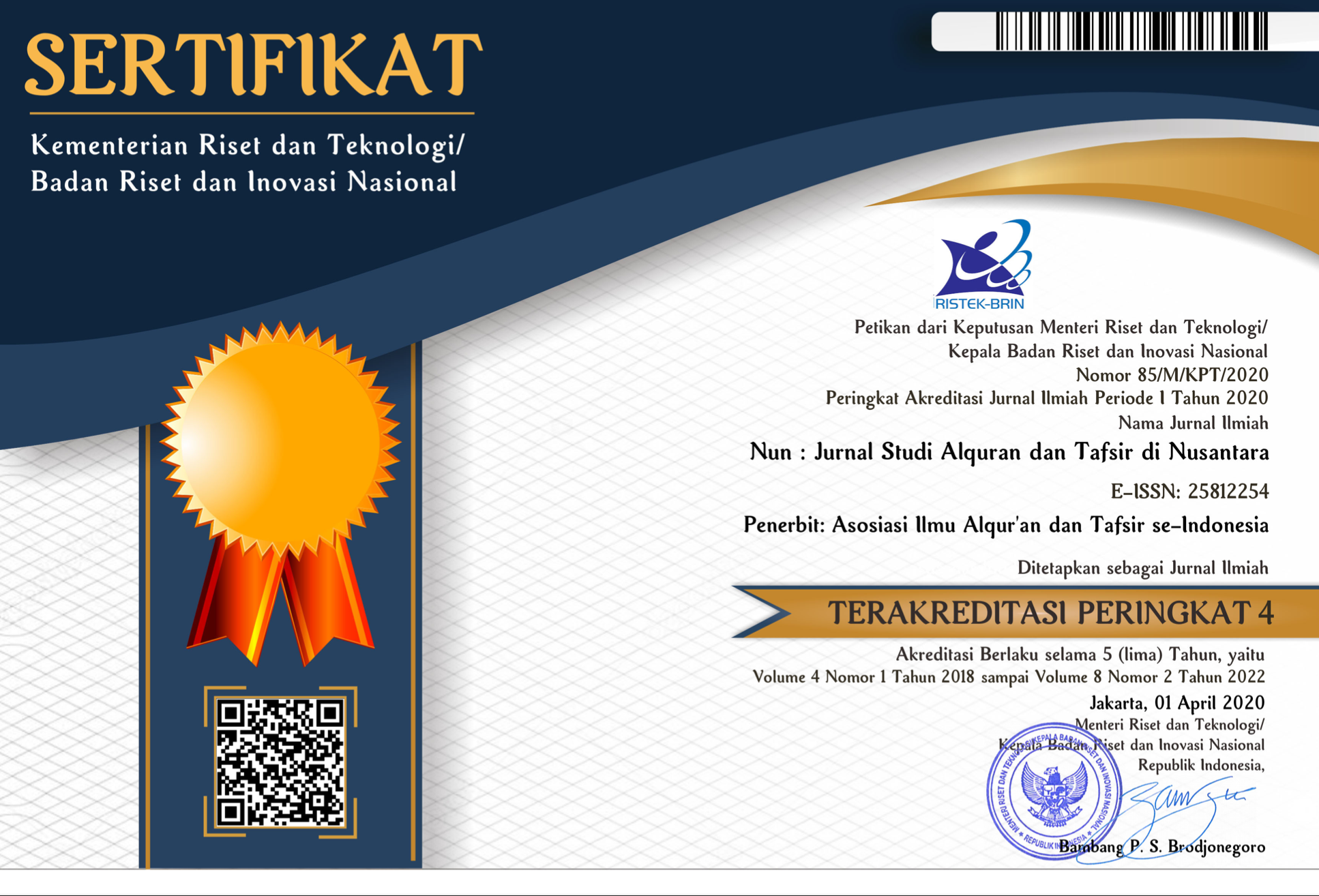Pendekatan Munasabah Psikologiah Muhammad Ahmad Khalafullah: Analisis Kisah Luth dan Kaumnya dalam Al-Qur’an
DOI:
https://doi.org/10.32495/nun.v5i2.94Abstract
One of the most important ways the Koran uses to convey the messages of God is to use stories. In the Qur’an, the mention of stories fulfills a quarter of the number of verses; there are recorded 1,453 to 1,600 verses. One of the stories in the Koran is the story of Lut and his people. The purpose of the present story is as a guide, warning, threat to humans. But some commentators have been ‘fascinated’ by revealing the reality of historical events, thus leaving the essence of the meaning contained. Khalafullah, in contrast to the others, tried to study the stories in the Koran by using literary methods. In his method, he revealed a psychological muna>sabah between stories and the conditions of the prophet or society when the Qur’an was revealed. This research found that, according to Khalafullah, the stories used by the Koran as an effective way to attract the interest and attention of Muslims at that time; found the relationship between the story of Lut and his people with the psychological condition of the Prophet and his followers, and there is a relation between the story of Lut and the psychological atmosphere of the Prophet’s opponents at that time. This research reinforces the theory that the context of the Prophet and his people when the Qur’an was revealed is a very important element to consider as someone tries to understand the message of the Qur’an.References
al-Ba>qiy, Muh}ammad Fu’ad Abd. Al-Mu’jam al-Mufahra>s li Alfa>z}
al-Qur’a>n al-Kari>m. Kairo: Da>r al-Hadits, 1364 H.
Affani,Syukron.”Diskursus Muna>sabah:Problem Tafsir al-Qur’ān bi
al-Qur’ān”, Jurnal Theologia, Vol. 28, No. 2, Desember 2017.
al-Mubarakfuri, Shafiyyurrahman. al-Rah}i>qu al-Makhtu>m: Sirah
Nabawiyah terj. Kathur Suhardi, Jakarta: Pustaka Al-Kautsar,
al-Suyu>ti>, Jala>l al-Di>n. al-Itqa>n fi> ‘Ulu>m al-Qura>n (Beirut: Da>r al-
Fikr, 2010), juz. 1.
al-Qaththan, Manna’. Pengantar Studi Ilmu Al-Qur’an,ter. Aunur
Rafiq, Jakarta: Pustaka Al-Kautsar, 2016.
al-T{abari>, Muh}ammad Ibn Jari>r. Ja>mi’ al-Baya>n fi> Ay Ta’wi>l al-
Qur’a>n, tah}q, Ah}mad Muh}ammad Sha>kir,(Ttp: Muathathah al-
Risa>lah, 2000), juz 15.
Amal,Taufiq Adnan. Rekonstruksi Sejarah Al-Qur’an (Jakarta:
Pustaka Alvabet, 2011), Edisi Digital.
Badruzaman, Abad. Ulumul Qur’an: Pendekatan dan Wawasan Baru,
Malang: Madani Press, 2018.
Devani,Sherly, Wawan Hernawan dan Izzah Faizah Siti Rusydati Khairani dengan judul “Muna>sabah dalam S}afwah al-Tafasi>r Karya Muh}ammad ‘Ali> al-S{abuni”,Al-Bayan: Jurnal Studi Al-Qur’an dan Tafsir, Vol. 2, No. 1, (Juni 2017).
Fadal, Kurdi. ”Pandangan Orientalis Terhadap Alquran (“teori pengaruh” Alquran Theodore Noldeke)”, Religia, Vol. 14, No. 2, Oktober 2011.
Hadi, Imam Ana. ”Peran Penting Psikologi dalam Pendidikan Islam”, dalam Nadwa: Jurnal Pendidikan Islam, vol. 11, No. 2 tahun 2017.
Http://cpchenko.blogspot.com/2012/07/muhammad-khalafullah.html/m=1. Di akses pada 14 Desember 2018. Pkl. 21.00.
Jabir,Muh. “Korelasi (Muna>sabah) Ayat danSurah dalam Alquran”, JurnalHunafa,Vol. 3 No. 4, Desember 2006.
Kathir,Abu al-Fida’ Ibnu. Tafsir Ibnu Katsir tahq. Abdullah bin Abdurrahman, terj. Abdu al-Ghaffar, dkk (Bogor: Pustaka Imam asy-Syafii, 2004), jilid 6.
Khalafullah, Muhammad Ahmad. Al-Qur’an Bukan “Kitab Sejarah”: Seni, Sastra dan Moralitas dalam Kisah-kisah Al-Qur’an, ter. Zuhairi Misrawi dan Anis Maftukhin. Jakarta: Pramadina, 2002.
Khalafullah, Muhammad Ahmad. Al-Fann al-Qas}as}i> fi> al-Qur’a>n al-Kari>m, Beirut: Shina, 1999.
Mahliatussikah, Hanik. ”Analisis Kisah Nabi Yusuf dalam al-Qur’an melalui Pendekatan Interdisipliner Psikologi Sastra”, dalam Arabi: Journal of Arabic Studies, Vol. 1 No. 2.
Marwing, Arman. ”Psikologi Postmodernisme: Kritik dan Tawaran terhadap Psikologi Positivistik”,dalam Kontemplasi: Jurnal Ilmu-ilmu Ushuluddin,Vol. 5, No. 2, Desember 2017.
Mustaqim, Abdul. ”Kisah Al-Qur’an: Hakikat, Makna, dan nilai-nilai Pendidikannya”, dalam Ulumuna:Jurnal Studi KeIslaman, Vol. XV, No. 2, Desember 2011.
Mustaqim, Abdul. Metode Penelitian Al-Qur’an dan Tafsir,Yogyakarta:
Idea Press, 2015.
Nadhiroh, Wardatun. ”Memahami Narasi Kisah al-Qur’an dengan
Narrative Criticism (Studi atas Kajian A.H. Johns),” dalam Ilmu
Ushuluddin, Juli 2013, Vol. 12, No. 2.
Rahmawati, “Muna>sabah al-At wa al-Suwar”Jurnal Adabiyah, Vol.
XIII, No. 2, 2013.
Ridhwan, Muhammad. Studi Perbandingan Pemikiran Muhammad
Ahmad Khalafullah dan Muhammad Abid al-Jabiri Tentang Kisah
dalam Alquran. Jakarta: UAI Press, 2018.
Said, Hasani Ahmad. ”Menggagas Muna>sabah Alquran: Peran
dan Model Penafsiran Alquran”, dalam Hunafa: Jurnal Studia
Islamika, Vol. 13, No. 1, Juni 2016.
Salim, Nahju al-Munji. Siku>lu>jiyyah al-Qissah fi> al-Qur’a>n. Tunis:
al-Syirkah al-Tunisiyah, 1974.
Setiawan, M. Nur Kholis. Al-Qur’an Kitab Sastra Terbesar,
Yogyakarta: elSaq Press, 2006, cet. 2.
Shihab, M. Quraish. Kaidah Tafsir: Syarat, Ketentuan, dan Aturan
yang Patut Anda Ketahui dalam Memahami Ayat-ayat al-Qur’an.
Jakarta: Lentera Hati, 2015, cet. 3.









